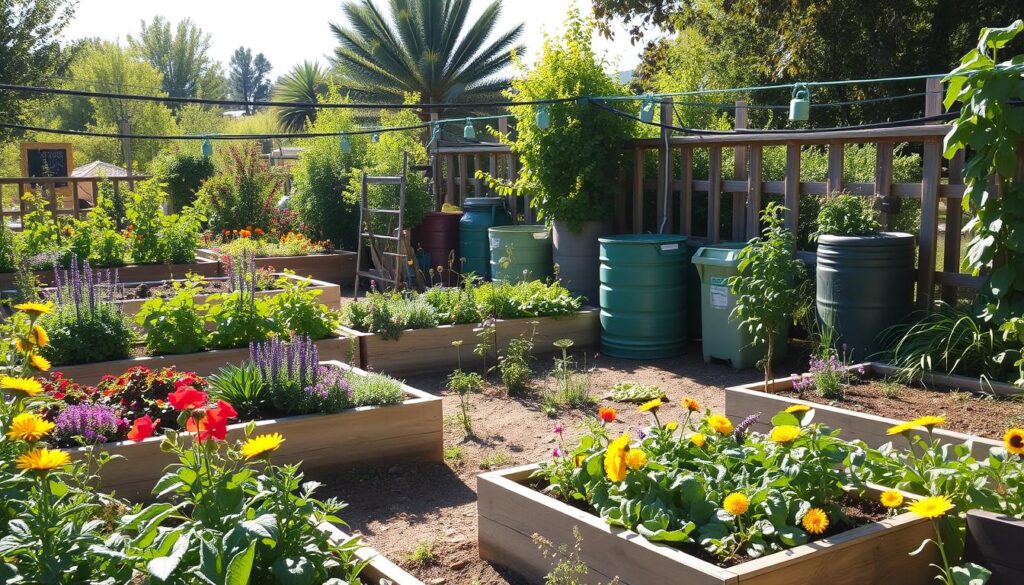Living a greener life can make a big difference for our planet. Simple actions like avoiding single-use plastics and recycling are key. You can also make bigger changes, like installing solar panels or using energy-efficient appliances.
Choosing a plant-based diet and supporting local food sources are also important. Saving water and reducing food waste are crucial steps. Using eco-friendly transportation and adopting a zero-waste lifestyle are vital too.
Even small choices, like using eco-friendly cleaning products, can help. These actions together can lead to a cleaner, greener future.
Key Takeaways
- Adopt eco-friendly practices to reduce your carbon footprint and contribute to a sustainable future.
- Implement simple changes at home, such as using renewable energy sources and energy-efficient appliances.
- Support local and sustainable food sources, and reduce water consumption and food waste.
- Choose eco-friendly transportation options and embrace a zero-waste lifestyle.
- Invest in sustainable businesses and advocate for policy changes to promote environmental conservation.
Start at Home: Embrace Sustainable Living
Making eco-friendly choices at home is a great way to start living more sustainably. Simple changes can greatly reduce your carbon footprint and help the planet.
Install Solar Panels and Renewable Energy Sources
Getting solar panels or other renewable energy for your home is a smart move. It gives you clean, green power and cuts down on traditional energy use. Although it costs more upfront, you’ll save money and help the environment in the long run.
Upgrade to Energy-Efficient Appliances and Lighting
Switching to energy-saving appliances and lights can really cut down on energy use and bills. Energy Star-certified appliances and LED lighting are top picks. They can slash your energy use by up to 80%.
Switch to Eco-Friendly Cleaning Products
Choosing eco-friendly cleaning products is good for you and the planet. They’re made from natural, safe ingredients. These green cleaning options work well and are kinder to both you and the Earth.
Insulate Your Home to Conserve Energy
Insulating your home well can make it more energy-efficient. It helps keep your home warm in winter and cool in summer. This saves energy, cuts down on carbon emissions, and lowers your utility bills.
By adopting these eco-friendly practices at home, you can make your living space more sustainable. You’ll also enjoy lower energy bills and a smaller environmental impact.
Reduce Your Carbon Footprint

It’s key to cut down your carbon footprint to fight climate change and lessen your environmental harm. Simple lifestyle changes can make a big difference. They help lower greenhouse gas emissions and support green practices.
Adopt a Plant-Based Diet
Switching to a plant-based diet is a powerful way to reduce your carbon footprint. Eating less meat and dairy and more fruits, veggies, and whole grains cuts down emissions. The livestock industry is a big source of greenhouse gases, so a plant-based diet can make a big impact.
Support Local and Sustainable Food Sources
Buying food from local and sustainable places, like farmer’s markets and CSAs, also helps. These places often have lower emissions from transport. They also support local farming that’s good for the environment.
Conserve Water and Reduce Food Waste
Conserving water and cutting down on food waste are also key. Simple steps like adjusting your water heater and using low-flow fixtures help. Being mindful of what you buy and eat also makes a difference. Composting food scraps prevents methane from landfills.
By making these changes, you can greatly reduce your carbon footprint. This helps create a healthier, greener future for all.
| Sustainable Practice | Impact on Carbon Footprint |
|---|---|
| Adopting a plant-based diet | Reduces greenhouse gas emissions from the livestock industry |
| Supporting local and sustainable food sources | Lowers transportation emissions and supports eco-friendly farming |
| Conserving water and reducing food waste | Prevents methane emissions from landfills and reduces resource consumption |
“The greatest threat to our planet is the belief that someone else will save it.” – Robert Swan
Eco-Friendly Practices for Transportation
Switching to greener ways to get around can really cut down on carbon emissions. Making eco-conscious choices helps clean the air, lowers emissions, and makes our planet healthier.
Choose Public Transportation or Carpooling
Using buses, trains, or subways is a smart move to cut down on driving. It not only reduces your carbon footprint but also saves money on gas and car upkeep. If public transport isn’t an option, try carpooling with others to share the ride and emissions.
Invest in an Electric or Hybrid Vehicle
For personal driving, electric or hybrid cars are a top choice. They use less fuel and cut down emissions a lot compared to regular cars. Electric vehicles (EVs) emit about 161 grams of carbon dioxide per mile, while hybrids emit 257 grams, and regular cars emit 374 grams. EVs can save you up to $21,500 over their lifetime on energy and maintenance.
| Mode of Transportation | Emissions (grams of CO2 per mile) |
|---|---|
| Electric Vehicle | 161 |
| Hybrid Vehicle | 257 |
| Gasoline-Powered Car | 374 |
| Bus | 100 |
| Train | 88 |
| Bicycle | 33 |
| Electric Scooter/Bike | 8 |
Choosing green transport options can greatly reduce your carbon footprint. It helps make our future more sustainable.
Embrace a Zero-Waste Lifestyle

Living a zero-waste lifestyle helps the planet and supports a greener future. By focusing on recycling and composting, you keep valuable resources from landfills. Cutting down on single-use plastics like water bottles and straws also helps fight plastic pollution.
Choosing to repair and repurpose items instead of buying new ones is smart. It makes products last longer and cuts down on waste. This way, you help the planet by following the circular economy model.
Recycle and Compost
Recycling and composting are key to a zero-waste life. By sorting your waste, you keep a lot out of landfills. This helps the environment and supports sustainable consumption and waste management.
Avoid Single-Use Plastics
Staying away from single-use plastics is a big step towards less waste and better environmental conservation. Say no to disposable items and choose reusable ones instead. This helps reduce plastic pollution.
Repair and Repurpose Instead of Replacing
Don’t throw things away just because they’re broken. Try to repair or repurpose them. This way, you save resources and support a circular economy.
By adopting these zero-waste habits, you help the planet and make a difference for the future.
| Sustainable Practices | Benefits |
|---|---|
| Recycling and Composting | Divert waste from landfills, support resource cycling |
| Avoiding Single-Use Plastics | Reduce plastic pollution, minimize waste |
| Repairing and Repurposing | Extend product lifespan, promote circular economy |
“The true meaning of life is to plant trees, under whose shade you do not expect to sit.” – Nelson Henderson
Support Sustainable Businesses and Organizations

We can make a big difference by choosing to support green businesses. When you buy things, look for products and services that are good for the planet. This means picking items made from recycled or renewable materials.
Also, choose services that use clean energy. By investing in companies that focus on green energy, we help move towards a cleaner future. Making eco-friendly choices shows we care about the planet and encourages others to do the same.
Choose Eco-Friendly Products and Services
Search for businesses that focus on being green. These companies use materials and energy that are better for the environment. They also try to reduce their harm to the planet.
Invest in Renewable Energy Companies
Putting money into green energy companies helps grow the clean energy sector. Think about setting aside some of your money for investments that support a greener future. This way, you help make a difference in the world.
| Sustainable Business Practices | Eco-Friendly Products and Services | Renewable Energy Companies |
|---|---|---|
|
|
|
By backing sustainable businesses and organizations, we help create a greener world. This supports conscious consumption, environmental responsibility, and renewable energy. Together, we can make a big positive change.
Also Read : Bamboo Regeneration: Nature’s Key to Panda Survival
Conclusion
Living an eco-friendly life is key to lessening our impact on the environment and fighting climate change. We can make a difference by choosing sustainable options at home and using greener ways to get around. Installing renewable energy and using efficient appliances also helps a lot.
Every small action counts. Keep working to improve and encourage others to do the same. Together, we can make a big change. This way, we’ll have a healthier planet for the future.
Starting a sustainable future is up to us. Let’s all try to live greener and support companies that care about the planet. With our efforts, we can create a better world for everyone.
FAQs
Q: What are some simple steps to go green in my daily life?
A: You can start by reducing energy consumption, using biodegradable products, and prioritizing sustainability in your purchasing decisions. Implementing sustainable practices like recycling, reusing items, and opting for green cleaning products can also make a positive impact.
Q: How can businesses integrate eco-friendly practices into their operations?
A: Businesses can demonstrate a commitment to sustainability by integrating sustainable practices such as waste reduction, energy efficiency, and sourcing from local businesses. These best practices not only help the environment but can also enhance the company’s reputation and brand image.
Q: What are the benefits of reducing waste at home?
A: Reducing waste leads to cost savings, conserves natural resources, and decreases the amount of pollutants entering landfills. Many eco-friendly strategies can help households minimize waste, such as composting and using reusable containers.
Q: How can I prioritize sustainability in my purchasing decisions?
A: Prioritizing sustainability involves choosing products that are environmentally friendly, made from recycled materials, or offered by suppliers with strong sustainability initiatives. Look for certifications or labels that indicate eco-friendliness and support local businesses that implement sustainable practices.
Q: What role does energy usage play in sustainability efforts?
A: Energy usage significantly impacts sustainability efforts. By reducing energy consumption through energy-efficient appliances and practices, individuals and businesses can lower their carbon footprint and contribute to conserving natural resources.
Q: Can small changes really make a significant impact on the environment?
A: Yes, small changes can collectively lead to a significant impact on reducing waste and conserving natural resources. Simple actions like turning off lights, using energy-efficient bulbs, and reducing water usage can contribute to a more sustainable lifestyle.
Q: What are some eco-friendly strategies for organizations looking to improve their corporate social responsibility?
A: Organizations can improve their corporate social responsibility by integrating eco-friendly strategies such as implementing sustainable practices, engaging team members in sustainability initiatives, and supporting local businesses that prioritize sustainability.
Q: How can I make my home more environmentally friendly?
A: To make your home more environmentally friendly, consider using green cleaning products, reducing water usage, implementing energy-efficient lighting, and establishing a recycling system. These practices not only help the environment but can also provide cost savings over time.
Q: What is the significance of biodegradable products in sustainability practices?
A: Biodegradable products play a crucial role in sustainability practices as they break down naturally and reduce the amount of waste in landfills. Using biodegradable items helps minimize the impact of pollutants on the environment and supports a healthier ecosystem.
Source Links
- https://www.outdoors.org/resources/amc-outdoors/conservation-and-climate/go-green-10-tips-for-a-more-sustainable-lifestyle/
- https://www.greenmatch.co.uk/blog/how-to-be-more-eco-friendly
- https://www.biologicaldiversity.org/programs/population_and_sustainability/sustainability/live_more_sustainably.html
- https://www.rinse.com/blog/time/sustainable-practices-at-home/
- https://www.econyl.com/magazine/how-to-embrace-a-more-sustainable-lifestyle-starting-from-today-in-8-steps/

